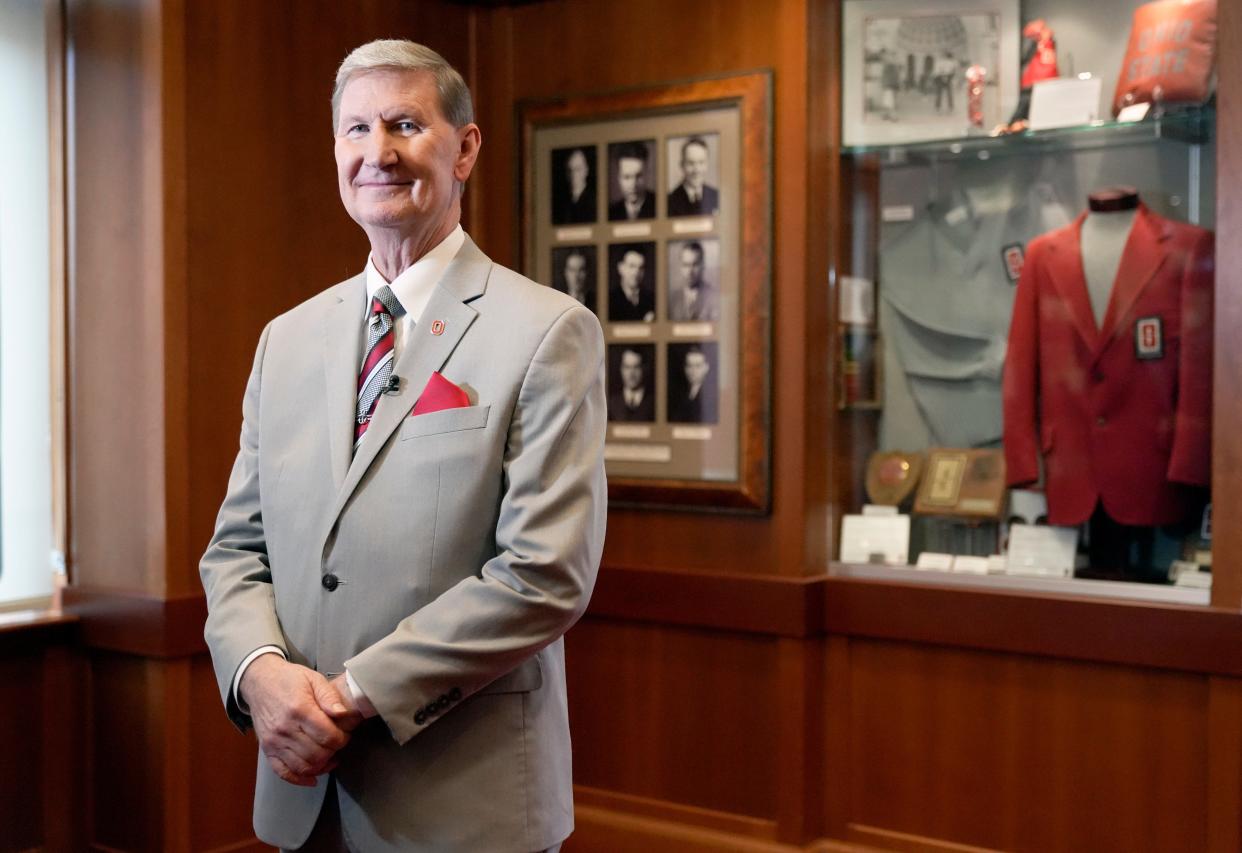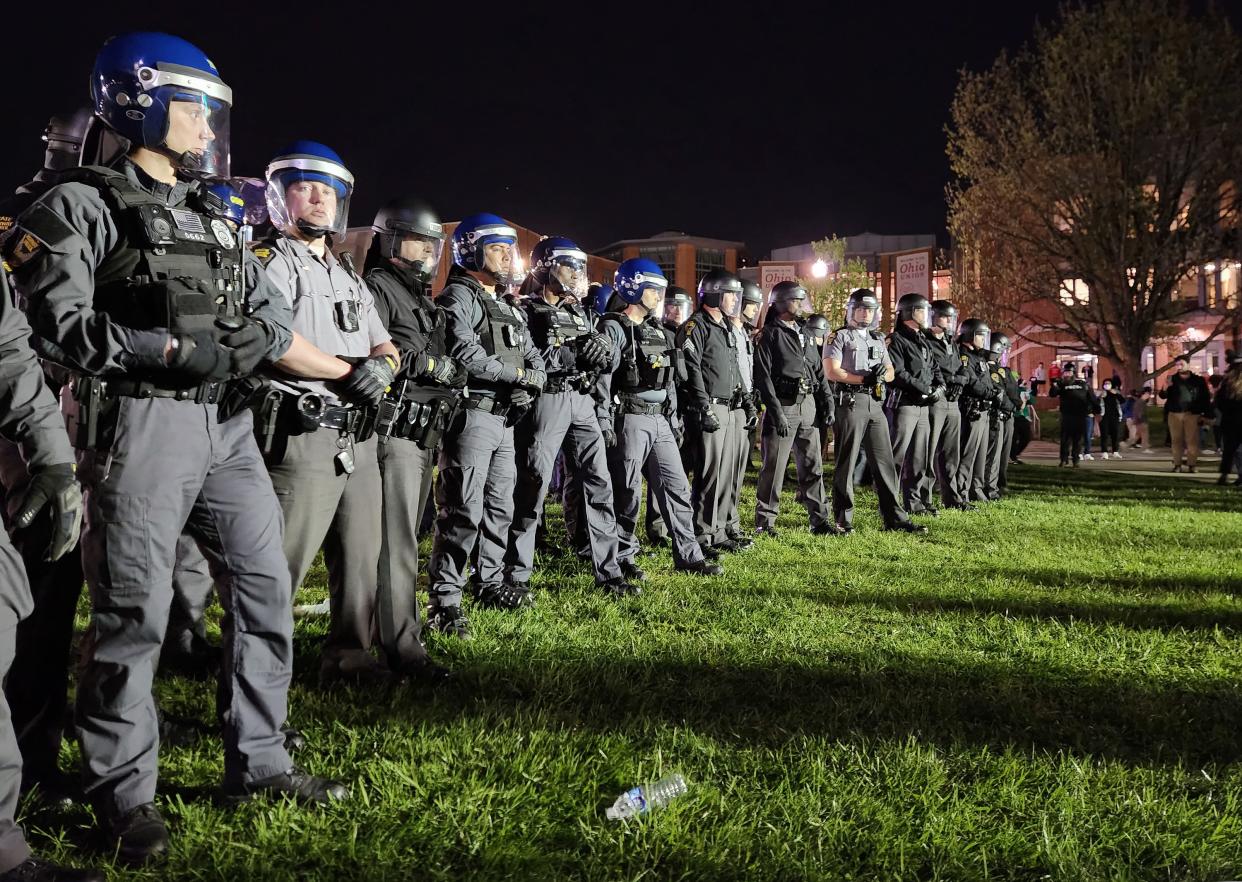Ohio State President Ted Carter reflects on campus protests, free speech and arrests
In the weeks following pro-Palestinian protests that led to dozens of on-campus arrests, Ohio State University President Ted Carter said he wants students to continue to use their voice — within the university's guidelines.
"We will continue to honor free speech, but you have to do it within the state of rules, which we've been very clear about," Carter told The Dispatch in a recent interview.
Protests became a hallmark on dozens of campuses nationwide this spring, stemming from outrage over civilian deaths during the Israel-Hamas war in Gaza that began Oct. 7. About 1,200 people in southern Israel were killed and more than 200 taken hostage in a Hamas-led attack, according to USA TODAY. Israel's retaliatory assault has killed nearly 35,000 Palestinians in Gaza, according to the Gaza Health Ministry, and destroyed much of its infrastructure.

Many protests were marked by violence as police officers tried to disperse participating students from their campuses. Police in riot gear swept onto the campus of the University of California, Los Angeles, and New York City police arrested hundreds of students as officers retook control of an administrative building at Columbia University.
More than 40 individuals were arrested during three separate largely peaceful demonstrations at Ohio State in late April, about half of whom were affiliated with the university.
During the largest protest on April 25, Ohio State Highway Patrol troopers and Ohio State University police officers used force against hundreds of protestors, many of whom were students and university employees. Many expressed frustration following the arrests and criticized the university for calling in state troopers on its own students.
Chaos on the @ohiostate campus as police drove demonstrators off the green and made well over a dozen arrests. pic.twitter.com/rkg3A6H5y9
— Cole Daniel Behrens (@Colebehr_report) April 26, 2024
Dalal Shalash — an Ohio State history and political science major and co-founder of the local Palestinian Liberation Movement-JUST — said at a protest the following week that she was among the 16 OSU students arrested during on April 25. She recounted her time detained in the Franklin County jail, and the feeling of being targeted on her own campus.
"We have been traumatized by OSUPD, calling in the state troopers on their own students," Shalash said at the time.
Carter said he's heard the criticism and seen the videos from April's protests. While he wishes that no one was arrested, Carter said he believes the university has handled things differently than other campuses in similar positions.
"We haven't expelled anybody from school. We haven't fired anybody. Yes, there's been some arraignments. I can't get involved in that," Carter said. "But you know, I certainly hope these things land. There's going to be life lessons to this."

He added during May's board of trustees meeting that the arrests "were not about limiting speech or the content of that speech."
"None of us wanted to see that type of action, and we tried to do everything we could to prevent that," Carter said at the meeting.
Carter told The Dispatch that the decision was made to call in state troopers and have Columbus Police officers on back up because OSU Police did not have enough officers to handle a 300-person protest and, specifically, a potential overnight encampment.
From his earliest days at Ohio State in January, Carter has frequently repeated his commitment to the First Amendment and free speech. He stepped into leadership three months after the Oct. 7 attacks and weeks after congressional lawmakers grilled the presidents of Harvard University, MIT and the University of Pennsylvania during a hearing. Carter said he kept tabs on what was happening on campus in the weeks leading up to his arrival.
There were more than 30 protests related to the war in Gaza on campus during spring semester, Carter said. He and his team met multiple times with student organizers and faculty advisors from groups like Hillel, Chabad and Students for Justice in Palestine.
"The tensions and the emotion was already very high, and I wanted to show a great deal of empathy to both of them," Carter said. "That's when I started to have the discussion."

Carter said students came into meetings with their own sets of demands for the university. One demand that some student protestors have called for is that Ohio State divest from companies associated with Israel. While Ohio law prohibits state universities from doing so, other colleges and universities across the country have begun exploring the idea.
When asked if Ohio State is interested in that conversation or pushing back from the state level, Carter said it has not engaged the state on the topic.
"The university is tied to state law and that's where it is right now," he said.
"We're gonna stick to what that is for now," Carter continued. "We are incredibly transparent about a lot of our investments and our endowments. It's complicated. We're not investing in any particular company or (Department of Defense) firm. We have mutual funds, just like a lot of other big universities with endowment."
Looking to this fall, when it's expected that protests will return in potentially greater force, Carter said the university is already working on programming on how to "disagree better" and hiring more campus police officers. Ohio State is also piloting Election Day a remote learning day, Carter said, to remind students "the biggest voice you can have is to use your vote."
"Let's face it: In our nation's history, protests on college campuses have been a way for the mindset of the nation to sometimes hear those voices," Carter said. "So we should understand that college campuses and our students should have an opportunity to have their voice not only be allowed to be heard, but to be heard."

Sheridan Hendrix is a higher education reporter for The Columbus Dispatch. Sign up for Extra Credit, her education newsletter, here.
@sheridan120
This article originally appeared on The Columbus Dispatch: Ohio State President Carter talks campus protests, free speech and arrests
